Laos-China Railway helps reviving domestic tourism of Laos
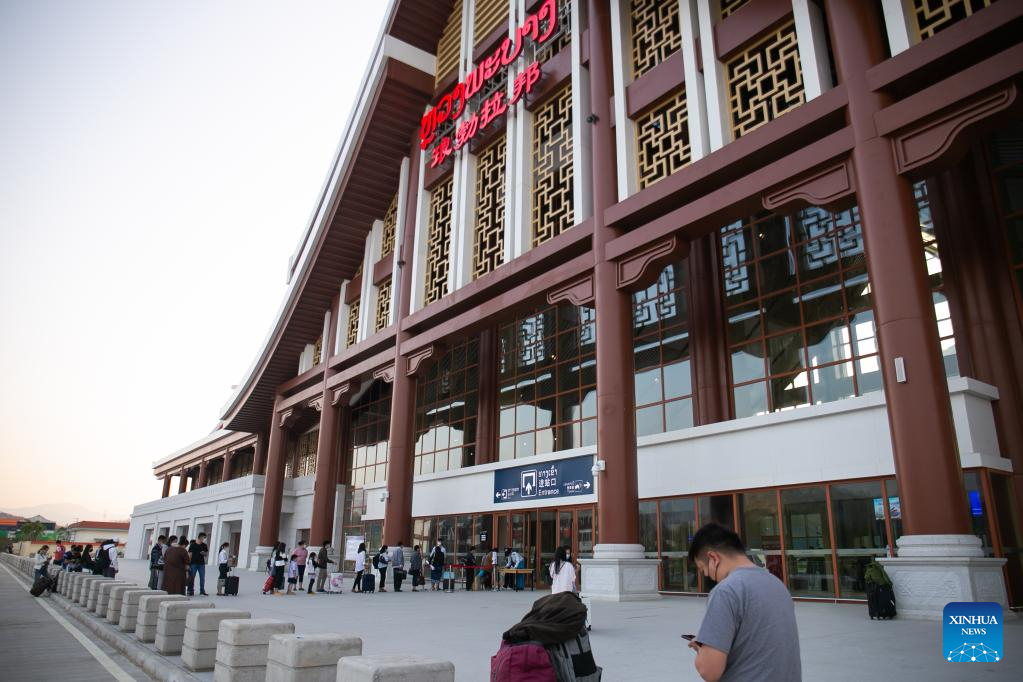 Photo taken on Feb. 25, 2022 shows a view of the Luang Prabang Station in Luang Prabang, Laos. The Laos-China Railway was put into operation in December of 2021, which helped reviving the domestic tourism of Laos. At present, the demand of passengers travelling between Vientiane and the ancient capital of Luang Prabang is growing.
Photo taken on Feb. 25, 2022 shows a view of the Luang Prabang Station in Luang Prabang, Laos. The Laos-China Railway was put into operation in December of 2021, which helped reviving the domestic tourism of Laos. At present, the demand of passengers travelling between Vientiane and the ancient capital of Luang Prabang is growing.
As of Feb. 22, the Lao section of the China-Laos Railway had run 146 pairs of EMU passenger trains, transporting 144,610 passengers, with a maximum of 2,804 on Jan. 3 and an average occupancy rate of 68.76 percent. (Photo by Kaikeo Saiyasane/Xinhua)
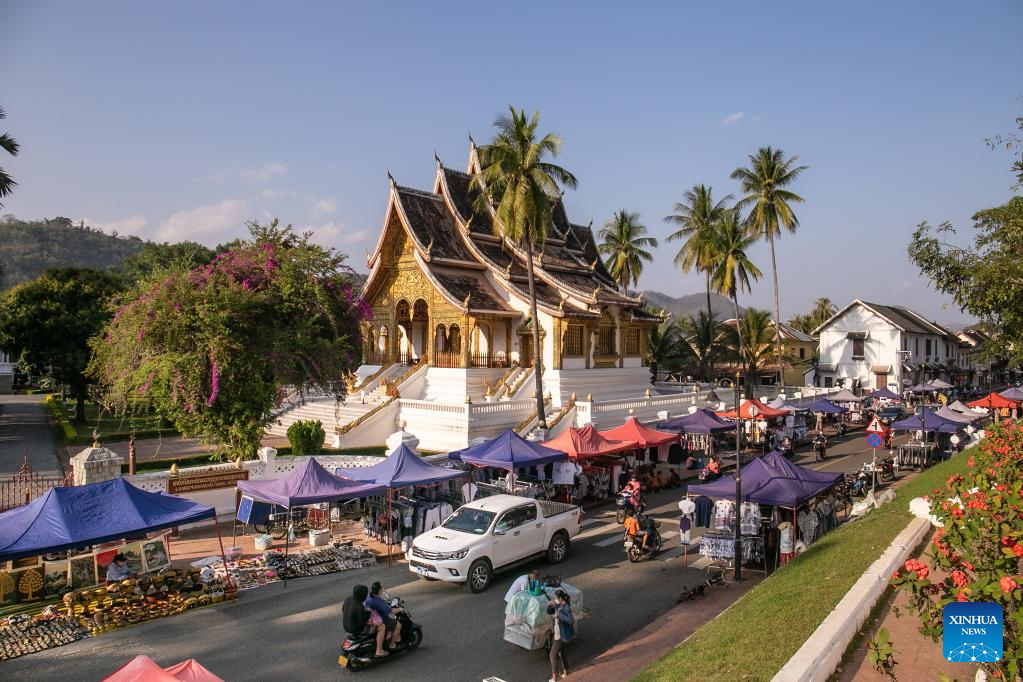 Photo taken on Feb. 25, 2022 shows a view of the ancient town of Luang Prabang, in Laos. The Laos-China Railway was put into operation in December of 2021, which helped reviving the domestic tourism of Laos. At present, the demand of passengers travelling between Vientiane and the ancient capital of Luang Prabang is growing.
Photo taken on Feb. 25, 2022 shows a view of the ancient town of Luang Prabang, in Laos. The Laos-China Railway was put into operation in December of 2021, which helped reviving the domestic tourism of Laos. At present, the demand of passengers travelling between Vientiane and the ancient capital of Luang Prabang is growing.
As of Feb. 22, the Lao section of the China-Laos Railway had run 146 pairs of EMU passenger trains, transporting 144,610 passengers, with a maximum of 2,804 on Jan. 3 and an average occupancy rate of 68.76 percent. (Photo by Kaikeo Saiyasane/Xinhua)
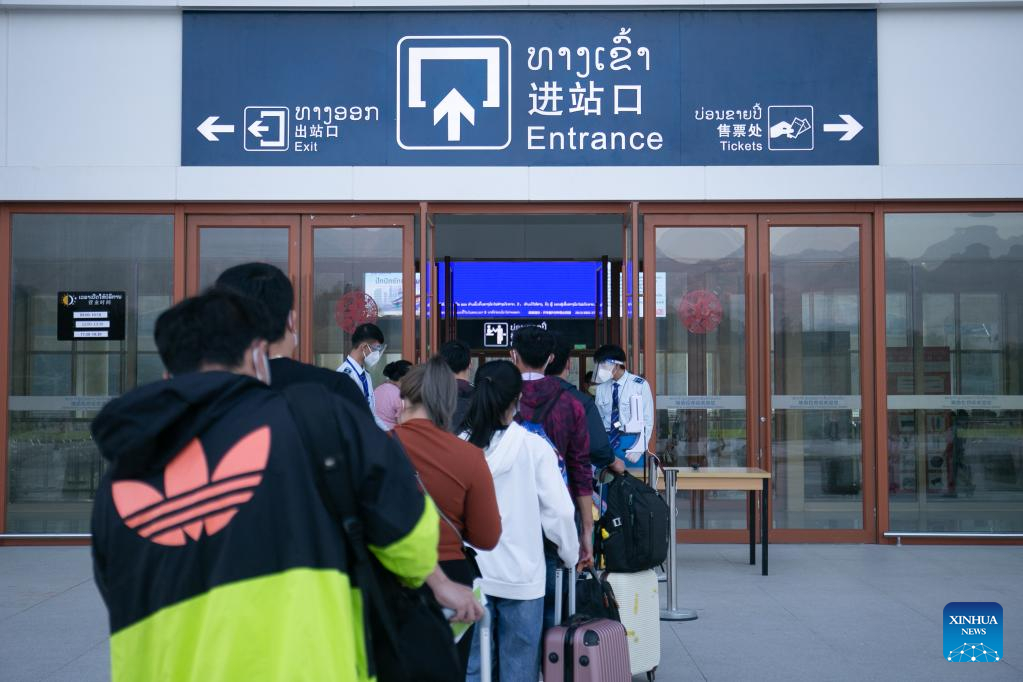 Photo taken on Feb. 25, 2022 shows a view of the Luang Prabang Station in Luang Prabang, Laos. The Laos-China Railway was put into operation in December of 2021, which helped reviving the domestic tourism of Laos. At present, the demand of passengers travelling between Vientiane and the ancient capital of Luang Prabang is growing.
Photo taken on Feb. 25, 2022 shows a view of the Luang Prabang Station in Luang Prabang, Laos. The Laos-China Railway was put into operation in December of 2021, which helped reviving the domestic tourism of Laos. At present, the demand of passengers travelling between Vientiane and the ancient capital of Luang Prabang is growing.
As of Feb. 22, the Lao section of the China-Laos Railway had run 146 pairs of EMU passenger trains, transporting 144,610 passengers, with a maximum of 2,804 on Jan. 3 and an average occupancy rate of 68.76 percent. (Photo by Kaikeo Saiyasane/Xinhua)
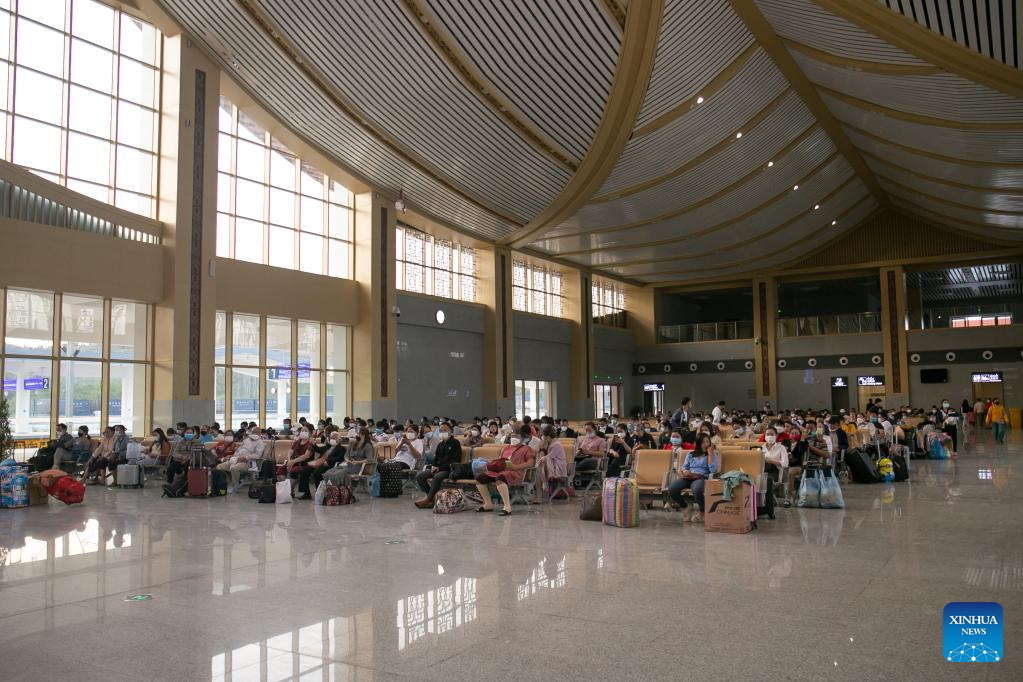 Photo taken on Feb. 25, 2022 shows the waiting hall of the Luang Prabang Station in Luang Prabang, Laos. The Laos-China Railway was put into operation in December of 2021, which helped reviving the domestic tourism of Laos. At present, the demand of passengers travelling between Vientiane and the ancient capital of Luang Prabang is growing.
Photo taken on Feb. 25, 2022 shows the waiting hall of the Luang Prabang Station in Luang Prabang, Laos. The Laos-China Railway was put into operation in December of 2021, which helped reviving the domestic tourism of Laos. At present, the demand of passengers travelling between Vientiane and the ancient capital of Luang Prabang is growing.
As of Feb. 22, the Lao section of the China-Laos Railway had run 146 pairs of EMU passenger trains, transporting 144,610 passengers, with a maximum of 2,804 on Jan. 3 and an average occupancy rate of 68.76 percent. (Photo by Kaikeo Saiyasane/Xinhua)
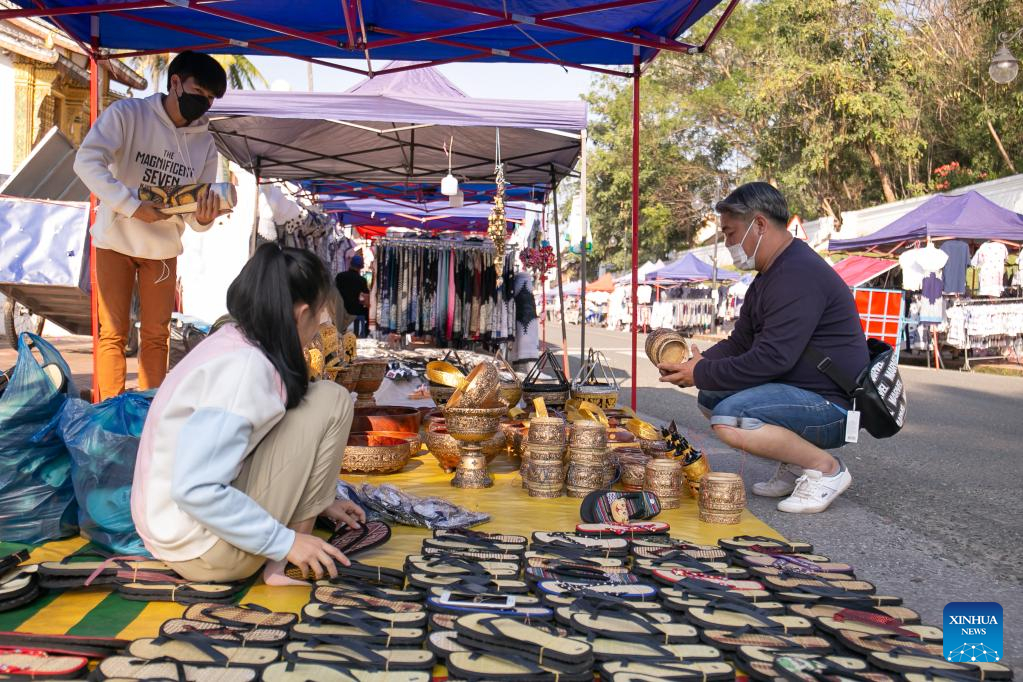 Photo taken on Feb. 25, 2022 shows a view of the ancient town of Luang Prabang, in Laos. The Laos-China Railway was put into operation in December of 2021, which helped reviving the domestic tourism of Laos. At present, the demand of passengers travelling between Vientiane and the ancient capital of Luang Prabang is growing.
Photo taken on Feb. 25, 2022 shows a view of the ancient town of Luang Prabang, in Laos. The Laos-China Railway was put into operation in December of 2021, which helped reviving the domestic tourism of Laos. At present, the demand of passengers travelling between Vientiane and the ancient capital of Luang Prabang is growing.
As of Feb. 22, the Lao section of the China-Laos Railway had run 146 pairs of EMU passenger trains, transporting 144,610 passengers, with a maximum of 2,804 on Jan. 3 and an average occupancy rate of 68.76 percent. (Photo by Kaikeo Saiyasane/Xinhua)
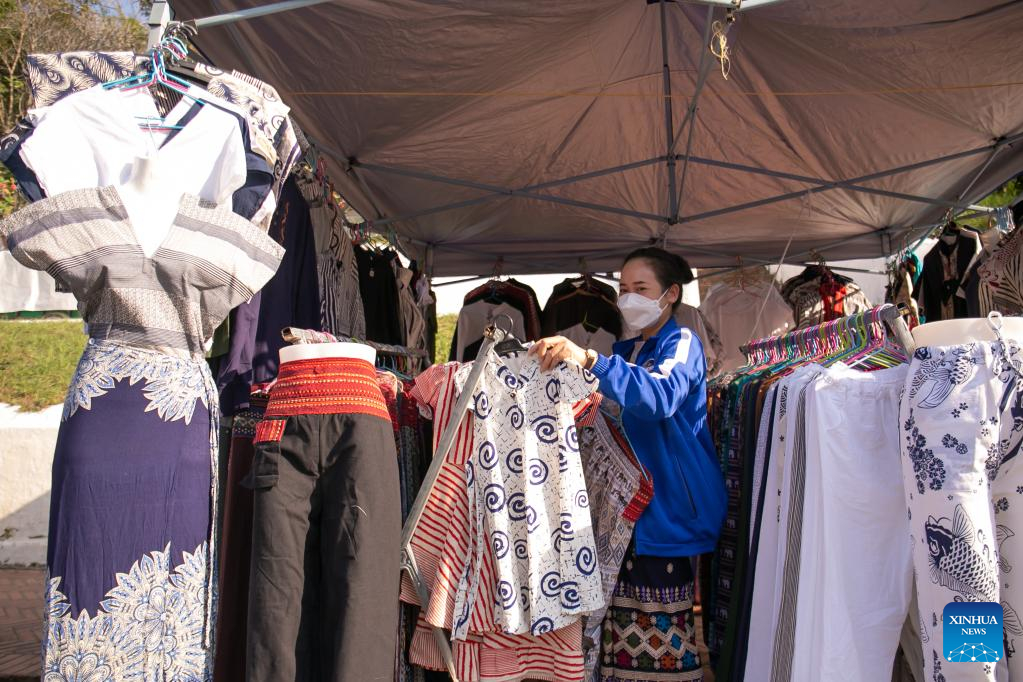 Photo taken on Feb. 25, 2022 shows a view of the ancient town of Luang Prabang, in Laos. The Laos-China Railway was put into operation in December of 2021, which helped reviving the domestic tourism of Laos. At present, the demand of passengers travelling between Vientiane and the ancient capital of Luang Prabang is growing.
Photo taken on Feb. 25, 2022 shows a view of the ancient town of Luang Prabang, in Laos. The Laos-China Railway was put into operation in December of 2021, which helped reviving the domestic tourism of Laos. At present, the demand of passengers travelling between Vientiane and the ancient capital of Luang Prabang is growing.
As of Feb. 22, the Lao section of the China-Laos Railway had run 146 pairs of EMU passenger trains, transporting 144,610 passengers, with a maximum of 2,804 on Jan. 3 and an average occupancy rate of 68.76 percent. (Photo by Kaikeo Saiyasane/Xinhua)
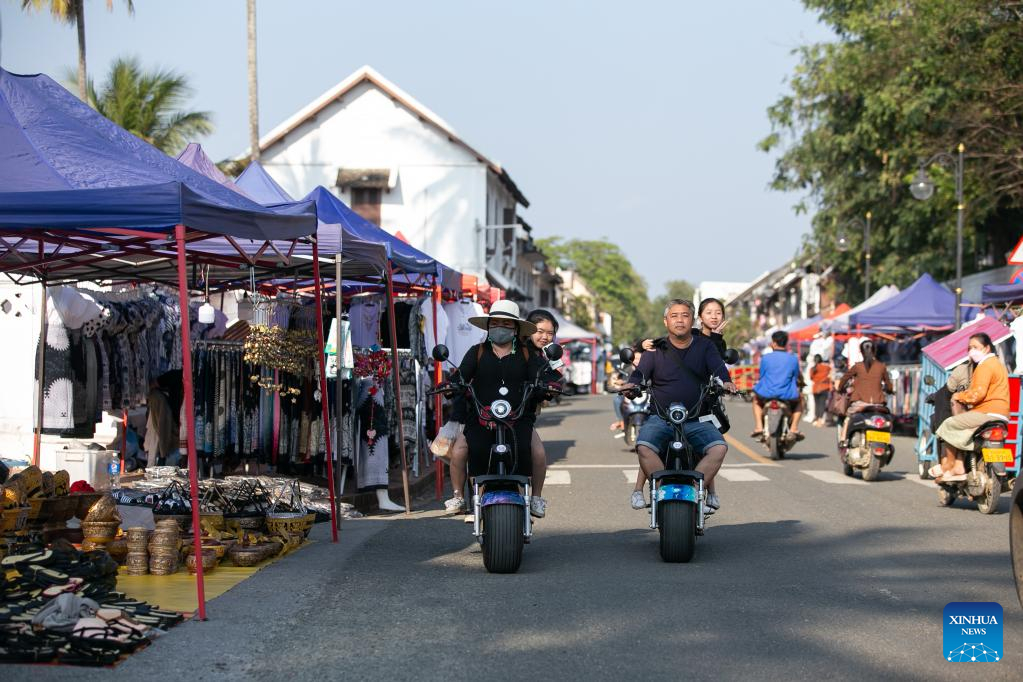 Photo taken on Feb. 25, 2022 shows a view of the ancient town of Luang Prabang, in Laos. The Laos-China Railway was put into operation in December of 2021, which helped reviving the domestic tourism of Laos. At present, the demand of passengers travelling between Vientiane and the ancient capital of Luang Prabang is growing.
Photo taken on Feb. 25, 2022 shows a view of the ancient town of Luang Prabang, in Laos. The Laos-China Railway was put into operation in December of 2021, which helped reviving the domestic tourism of Laos. At present, the demand of passengers travelling between Vientiane and the ancient capital of Luang Prabang is growing.
As of Feb. 22, the Lao section of the China-Laos Railway had run 146 pairs of EMU passenger trains, transporting 144,610 passengers, with a maximum of 2,804 on Jan. 3 and an average occupancy rate of 68.76 percent. (Photo by Kaikeo Saiyasane/Xinhua)